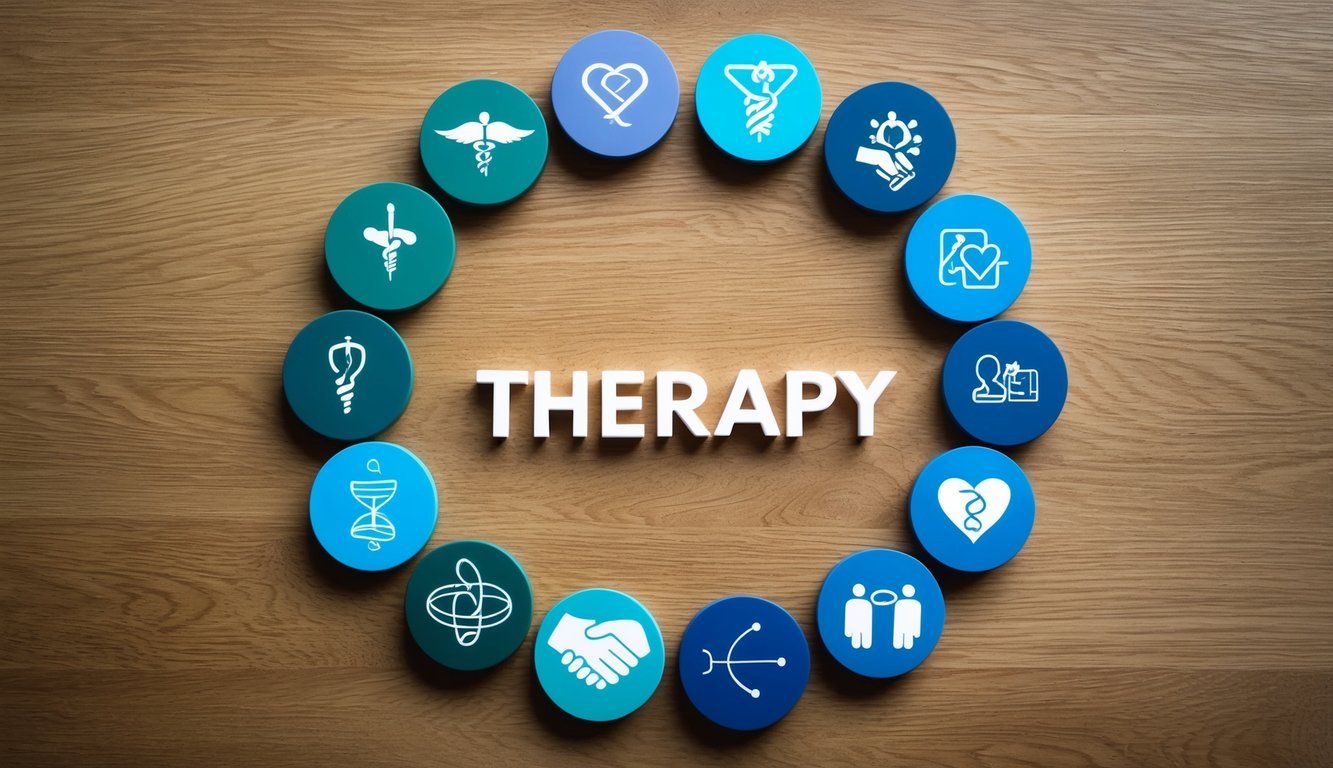PsychNewsDaily Publishers
100 Summit Drive
Burlington, MA, 01803
Telephone: (320) 349-2484
PsychNewsDaily Publishers
100 Summit Drive
Burlington, MA, 01803
Telephone: (320) 349-2484
Therapy encompasses various methods for addressing mental health issues, including psychotherapy, behavioral techniques, humanistic approaches, and evidence-based practices tailored to individual needs.

Therapy includes a range of methods aimed at addressing mental health and behavioral challenges. These techniques vary from conversational interventions to structured behavioral strategies, with each approach customized to the unique needs of clients.
Psychotherapy consists of discussions with a mental health expert to delve into thoughts, emotions, and behaviors, with the goal of enhancing emotional wellness and developing effective coping mechanisms. Common methodologies include:
• Cognitive-behavioral therapy (CBT)
• Psychodynamic therapy
• Interpersonal therapy
These therapeutic modalities often concentrate on past experiences and current challenges. For example, CBT assists in identifying and altering negative thought patterns, while psychodynamic therapy investigates unconscious drives, and interpersonal therapy focuses on relationship dynamics.
Typically, sessions take place weekly and last between 45 to 60 minutes, with the overall treatment duration varying according to individual progress and requirements.
Behavioral therapy is centered on altering specific behaviors using principles of learning. This approach is particularly effective for issues like phobias, anxiety disorders, and addictions. Key methods include:
• Systematic desensitization
• Exposure therapy
• Applied behavior analysis (ABA)
These techniques frequently involve gradual exposure to feared stimuli or the reinforcement of positive behaviors. For instance, exposure therapy could assist someone in overcoming their fear of flying by systematically introducing airplane-related stimuli.
Behavioral techniques are generally short-term and focused on achieving measurable outcomes.
Humanistic and existential therapies prioritize personal development, self-fulfillment, and the quest for meaning in life. These strategies comprise:
• Person-centered therapy
• Gestalt therapy
• Existential psychotherapy
These therapies emphasize the present experience and the client’s personal perspective, promoting self-discovery and accountability.
Person-centered therapy, founded by Carl Rogers, highlights the significance of unconditional positive regard and empathy. Gestalt therapy emphasizes immediate awareness and responsibility, while existential psychotherapy tackles essential questions of existence and meaning.
These approaches usually adopt a non-directive stance, empowering clients to steer the therapeutic journey.

Cognitive and cognitive-behavioral therapies concentrate on adjusting thoughts and behaviors to reduce psychological distress. These evidence-driven approaches have demonstrated effectiveness for numerous mental health issues.
Cognitive-behavioral therapy operates on the principle that thoughts, feelings, and behaviors are interrelated. CBT aims to identify and confront negative thought patterns, replacing them with healthier alternatives. This often includes:
• Cognitive restructuring
• Behavioral experiments
• Exposure therapy
Therapists collaborate with clients to establish goals and develop coping strategies. CBT is typically short-term, addressing current issues rather than delving into past experiences.
This structured approach often includes homework assignments to reinforce skills learned during sessions. CBT is well-researched and has proven effective for disorders like depression, anxiety, and others.
CBT encompasses various specialized techniques tailored to particular disorders or therapeutic objectives. Noteworthy methods include:
These variations integrate elements like mindfulness practices or specific trauma-informed interventions. For example, cognitive processing therapy specifically targets post-traumatic stress disorder.
Additionally, rational emotive behavior therapy emphasizes identifying and challenging irrational beliefs. These specialized strategies allow therapists to cater to the individual needs of clients while adhering to CBT’s foundational principles.
Dialectical behavior therapy, a subtype of CBT, was originally designed for borderline personality disorder treatment. DBT merges traditional cognitive-behavioral strategies with mindfulness and acceptance principles.
Key elements of DBT comprise:
• Mindfulness skills
• Distress tolerance
• Emotion regulation
• Interpersonal effectiveness
DBT generally includes individual therapy sessions, group skills training, and phone coaching. This holistic approach aids clients in managing intense emotions and mitigating self-destructive tendencies.
While initially focused on borderline personality disorder, DBT has proven beneficial for various other conditions, such as eating disorders, substance use disorders, and depression with suicidal thoughts.

Psychodynamic and analytic therapies seek to investigate unconscious processes and past experiences to foster self-awareness and emotional development. These methods highlight the therapeutic relationship and insight as vital mechanisms for change.
Psychoanalysis, formulated by Sigmund Freud, serves as the cornerstone of psychodynamic therapy. It conducts frequent sessions where patients articulate thoughts and feelings freely, and the analyst interprets unconscious conflicts and defense mechanisms.
Classical psychoanalysis has evolved over time, with object relations theory assessing how early relationships shape personality. Concurrently, self-psychology emphasizes empathy and creating a cohesive self-identity.
Modern psychoanalytic practices are generally more flexible, often involving fewer sessions and a less formal seating arrangement. Techniques such as dream analysis and transference interpretations remain key tools.
Contemporary psychodynamic therapies retain fundamental psychoanalytic principles while incorporating modern concepts. Brief psychodynamic therapy streamlines treatment into 16-30 sessions, focusing on specific issues.
Mentalization-based therapy aids patients in comprehending mental states, whereas transference-focused psychotherapy examines personality disorders through the lens of the therapeutic relationship.
These methods emphasize the role of attachment and early experiences, aiming to enhance self-awareness and interpersonal functioning. Evidence supports their effectiveness for conditions such as depression, anxiety, and personality disorders.

Evidence-based treatments have transformed mental health care strategies. These interventions undergo rigorous testing to confirm their effectiveness for various psychological issues.
Cognitive Behavioral Therapy (CBT) is primarily used to treat anxiety disorders and depression, centering on recognizing and altering negative thought patterns and behaviors.
For generalized anxiety disorder, exposure therapy is frequently employed, gradually exposing individuals to anxiety-inducing scenarios to diminish fear responses.
Medication, specifically selective serotonin reuptake inhibitors (SSRIs), is commonly prescribed for both anxiety and depression, aiding in the regulation of brain chemistry and alleviating symptoms.
Mindfulness-based therapies have become popular for managing mood disorders, teaching individuals to concentrate on the present moment to minimize rumination and anxiety.
Eye Movement Desensitization and Reprocessing (EMDR) has gained recognition as an effective treatment for post-traumatic stress disorder (PTSD). It requires recalling traumatic memories paired with bilateral stimulation.
Prolonged Exposure therapy serves as another evidence-based method for PTSD, where patients confront trauma-related memories and situations within a controlled environment.
Cognitive Processing Therapy aids individuals with PTSD in challenging and restructuring unhelpful beliefs linked to their trauma, significantly alleviating symptoms and enhancing quality of life.
Dialectical Behavior Therapy (DBT) has proven effective for borderline personality disorder, equipping individuals with skills in mindfulness, distress tolerance, emotion regulation, and relationship effectiveness.
For treating substance use disorders, Motivational Interviewing represents a client-centered strategy that bolsters motivation for change, guiding people to resolve their ambivalence surrounding substance use.
Cognitive Behavioral Therapy is also applicable for substance use disorders, addressing the thoughts and behaviors that contribute to addiction while promoting the development of coping strategies.
Contingency Management employs positive reinforcement to encourage substance abstinence, demonstrating success across various addiction treatments.

To effectively treat diverse populations, approaches must accommodate cultural contexts, family dynamics, and technological advancements. These elements are vital in customizing interventions for optimal efficacy across different settings.
Family therapy targets relationship dynamics and communication patterns within families, assisting in conflict resolution and enhancing overall family functioning.
Couples therapy aims to boost relationship satisfaction and address specific partner-related issues, focusing on communication improvement, rebuilding trust, and strengthening emotional connections.
Group therapy offers a supportive atmosphere for individuals experiencing similar challenges, fostering peer support, collective learning, and personal development through guided discussions and activities.
Marriage and family therapy merges individual, couple, and family intervention techniques, tackling intricate interpersonal dynamics and promoting healthier relationships within family systems.
These therapeutic approaches can be adjusted to cater to diverse populations, taking into account cultural norms, family structures, and individual preferences.
Cultural sensitivity is crucial in crafting effective treatments for diverse groups. Therapists must acknowledge and respect cultural beliefs, values, and practices that impact views on mental health and seeking help.
Approaches that respect cultural contexts include:
Culturally competent interventions may necessitate alterations to established treatment protocols to ensure they resonate across diverse ethnic, racial, and cultural communities.
Teletherapy and online counseling have transformed how mental health services are delivered. These platforms enhance accessibility for individuals in remote locations or those with mobility challenges.
Advantages of technology-driven interventions encompass:
Virtual reality (VR) applications in therapy provide immersive experiences for treating phobias, PTSD, and other anxiety disorders, allowing controlled exposure to triggering situations in a secure environment.
Mobile applications offer tools for self-monitoring, mood tracking, and practicing coping strategies between therapy sessions. These augment traditional therapeutic approaches, improving engagement and effectiveness.
As technology continues to develop, ethical standards and guidelines for online therapy also evolve, ensuring quality care in digital settings.